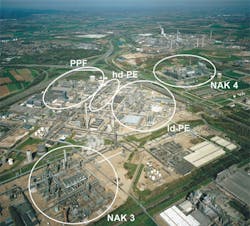SABIC to permanently shutter naphtha cracker in the Netherlands
Saudi Arabian Basic Industries Corp. (SABIC) subsidiary SABIC Limburg BV has undertaken a 3-month turnaround of its petrochemical operations at the Chemelot industrial park in Geleen, the Netherlands, after which one of the operator’s two naphtha crackers will remain permanently shuttered.
Initiated on Apr. 12-13 and scheduled to run until mid-July, the major sitewide maintenance event—executed every 6 years—will include the decommissioning and permanent closure of Geleen’s Olefins 3 naphtha cracker, as well as works at five other unidentified units at the complex, SABIC Limburg said.
The operator confirmed its Olefins 4 at Geleen will continue to operate normally throughout the turnaround and remain operable thereafter.
Works to be carried out during this year’s multi-million turnaround—including closure of the Olefins 3 cracker—come as part of SABIC’s strategic reorientation of the Geleen site based on the operator’s careful evaluation of market conditions, the company said.
In addition to enabling SABIC to prepare the Geleen operations for future success in a competitive market, the unspecified projects align with the company’s strategies of optimizing its product portfolio, improving overall site efficiency, and investing in sustainable, core assets to achieve carbon neutrality of its operations by 2050, SABIC Limburg said.
"These changes mark an important step in SABIC's commitment to a more sustainable future and adaptation to changing market conditions. [Our Geleen site] remains committed to efficiency improvements and initiatives that support our [carbon] neutrality and circularity goals,” said John Bruijnooge, general manager for SABIC Limburg at Geleen.
Neither SABIC Limburg nor its parent company confirmed specific production capacities of units at the Geleen site, but data from the Gulf Petrochemicals and Chemicals Association (GPCA)—which represents downstream hydrocarbon operators based in the Arabian Gulf—estimates ethylene capacities of the Olefins 3 and 4 crackers at 550,000 tpy and 675,000 tpy, respectively.
Alongside its two naphtha crackers, SABIC Limburg’s Geleen operations also include downstream plants for production of high-density polyethylene, low-density polyethylene, polypropylene, benzene, butadiene, and ethyl tertiary butyl ether, according to the SABIC subsidiary’s website.
New plant for advanced plastics recycling
The company said an essential part of its strategy for Geleen is ongoing development of SABIC Plastic Energy Advanced Recycling BV (SPEAR), a joint venture of SABIC and Plastic Energy Ltd. formed in January 2021 to operate a new advanced recycling unit at the site designed to further the circular economy via upscaling production of certified circular polymers derived from used plastic.
Scheduled for startup by yearend 2024, SPEAR’s advanced recycling unit at Geleen will be equipped to process 20,000 tonnes/year (tpy) of plastic waste into circular polymers originating from sustainable materials that have been recycled, repurposed, and manufactured in a way that conserves the planet’s natural resources, while also acting as a drop-in solution.
SPEAR’s plant will be outfitted with Plastic Energy’s advanced recycling technology to convert low-quality, mixed, and used plastic—otherwise destined for incineration or landfill—into a liquid called TACOIL that SABIC will subsequently use in its production process as an alternative to traditional fossil materials to create new, circular polymers, Plastic Energy said in October 2021.
About the Author
Robert Brelsford
Downstream Editor
Robert Brelsford joined Oil & Gas Journal in October 2013 as downstream technology editor after 8 years as a crude oil price and news reporter on spot crude transactions at the US Gulf Coast, West Coast, Canadian, and Latin American markets. He holds a BA (2000) in English from Rice University and an MS (2003) in education and social policy from Northwestern University.

